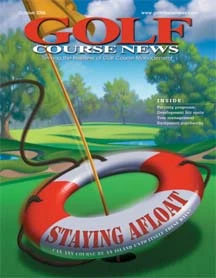I don’t need to remind readers of this magazine how difficult it can be working in this industry. Just like any other business, it has its pros and cons.
Among those difficulties, assistant golf course superintendents are focused on one biggie: breaking into the world of head golf course superintendents. By all accounts, “going to the next level” is infinitely more difficult than it was 20 years ago. With as many as 1,500 bright young students graduating from turf schools coupled with the decline of new golf course openings, there are more graduates than jobs. It’s survival of the fittest, and it’s clear the industry will weed out those who can’t handle the stress and rigors of the job. Will you be one of those?
Last month, at the inaugural Green Start Academy hosted by Bayer Environmental Science and John Deere Golf & Turf, an assistant superintendent told the group that of the eight people who graduated with him from a turfgrass program in Iowa several years ago, he was the only one left in the business. The reason for this instant attrition might be opportunity, desire and commitment, or both, but it’s a clear indicator things have changed.
Time management and education are key elements to an assistant’s ascension. They can advance by using what they have and what’s available to them, including: becoming actively involved in GCSA chapters; seeking mentors other than a boss; taking people- and financial-management classes to become more well rounded; learning about warm-season turfgrass if one’s in the North and vice versa; and attending the Golf Industry Show.
The self-improvement list is endless, but the bottom line is that assistants need to think about the big picture and long term. They need to implement a strategy to get them where they want to be in 10 or 15 years.
Money and patience also are key elements assistants need to consider. Bruce Williams, CGCS, director of golf courses and grounds at the Los Angeles Country Club, tells assistants not to focus too much on money, but rather who they work for – namely higher-profile superintendents at well-known clubs. Money shouldn’t be the driving factor – experience should. Money will follow the experience. Ken Mangum, CGCS, director of golf courses and grounds at the Atlanta Athletic Club, says that when looking through assistants’ resumes, he looks first and foremost at who they’ve worked for.
As with anyone who wants to advance in a profession, determining one’s weaknesses and improving those is a must. In this industry, those tend to be effective communications, people management, staff motivation, financial management and even developing an agronomic support system (because nobody knows it all). Successful superintendents have mastered these aspects of the business.
Another element of professional advancement is adhering to proper business etiquette. It might seem trivial, but attention to detail goes a long way.
Assistants can take or leave this advice, but it’s hard to ignore the wisdom of Williams, who has reached the pinnacle of the profession. He says the key to becoming a successful, well-respected head superintendent is to bridge the gap between the background and knowledge of turfgrass science to management and leadership. Being able to train people and supervise them is paramount to running a successful golf course maintenance staff.
Assistants need to hone their business skills and focus on aspects of the business such as management, budgets, payroll and strategic planning. The quicker they learn these aspects of the business, the better off they’ll be, because when they get hired as a superintendent, they’ll be expected to operate effectively in those areas.
Much of the onus to grow professionally is put on assistants; however, head superintendents need to create an environment in which professional development is expected and encouraged. As a superintendent, are you doing all you can to prepare your assistants for the next level? Would your assistant be able to take over the reigns if something happened to you?
Assistants should heed advice from the likes of Williams and Mangum because they’re successful. Williams says there’s room at the top for people who do exceptional work and go above and beyond what’s expected of them. It’s a bumpy road to the top of the industry, but it can be smoother. Williams and Mangum made it to the top, will you? GCN

Explore the October 2006 Issue
Check out more from this issue and find your next story to read.
Latest from Golf Course Industry
- The Cabot Collection announces move into course management
- Carolinas GCSA raises nearly $300,000 for research
- Advanced Turf Solutions’ Scott Lund expands role
- South Carolina’s Tidewater Golf Club completes renovation project
- SePRO to host webinar on plant growth regulators
- Turfco introduces riding applicator
- From the publisher’s pen: The golf guilt trip
- Bob Farren lands Carolinas GCSA highest honor







